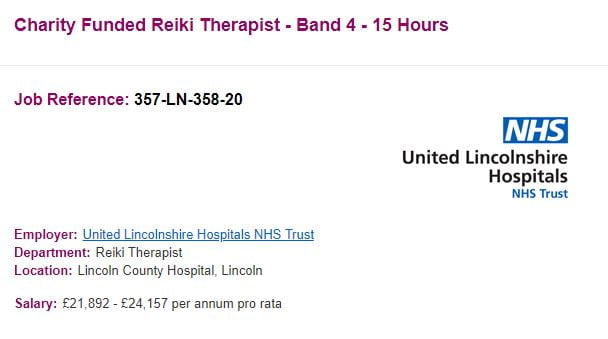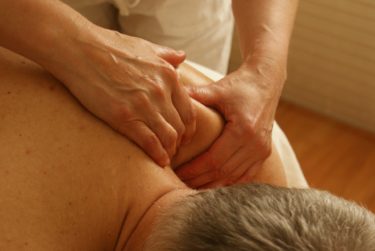So, let’s be very clear about this to start out with; Reiki is nonsense. It’s nonsense of the highest order. For the uninitiated, Reiki is a form of alternative medicine based on the concept of a universal life force known as qi (or, chi). Practitioners claim to be able to manipulate this energy, usually through their palms, to promote wellbeing and healing. There is no reliable evidence that they can do so, or that qi even exists. It was even debunked by an eleven year old. Imagine therefore the outrage when this job posting from the NHS reared its ugly aura:
Spiritual Healer / Reiki Therapist – Band 4 – 15 hours
Cue immediate criticism on social media from Skeptics, Humanists, and, not surprisingly, from a number of Band 3 NHS employees. Those of us who applauded the NHS in the hell-cyon days of early Covid-19 lockdown were decrying the chronic underfunding and perceived dismantling of our nation’s pride. Surely our beloved NHS weren’t then wasting their limited resources on bogus treatments like this?
Well, thankfully not. Shortly afterwards the job description was conspicuously changed:

However, the fact that the NHS isn’t directly funding this position only partially dowses the flames of discontent.
Interestingly it appears that there was also some kind of assumption from the administrators that the eye of the tweetstorm was focused on the “Spiritual Healer” part of the job description, and that somehow Reiki would get a pass. It certainly doesn’t, and there’s still plenty to be concerned about: there’s the perceived legitimacy that alternative medicine gets from being an indirect part of the NHS care package; the administrative and logistical costs of incorporating those externally funded staff members into the overall running of the hospital; the disturbing fact that these so-called ‘Healers’ are permitted to take part in multidisciplinary team meetings to discuss treatment plans for patients; and the even more disturbing fact that highly qualified medical professionals have given the hand-wavers a waiver on this. On top of all that there’s also the time and effort of whoever was unfortunate enough to be managing the social media accounts of United Lincolnshire Hospitals NHS Trust when the news broke. You’re doing a fine job whoever you are!

All of these perfectly valid concerns might give reason to mount a robust campaign to oust them from the wards, but arguably it may not be quite as simple as that. There’s another, bigger problem out there, and while the pseudoscientists are attempting to address it in their own misguided way, we Skeptics can sometimes be too busy behind our keyboards to notice it.
The job in question is at the Waddington Unit in Lincoln County Hospital, a haematology and oncology unit caring for patients receiving chemotherapy/radiotherapy and end of life care. Cancer treatment isn’t fun. We don’t recommend you put it on your bucket list… unless have cancer, in which case we recommend you put it at the very top of your bucket list. The treatment can be incredibly punishing on the body, but it also takes a considerable toll on the mind. Aside from what is most probably some excellent bedside manner from the (genuine) healthcare professionals who work there, it’s likely that they have limited extra time to spend with those patients. If they had more time and resources, perhaps they might not be so open to inviting practitioners of complementary medicine onto their premises.
Pain is real, but it’s subjective. So is nausea. Ever been ill and been lucky enough to have someone who cared about you enough to give you some care and attention? Did it make you feel better? Even for a short while? Facts don’t care about your feelings, but your feelings matter. The feelings of cancer patients certainly matter. It seems therefore that one could fairly argue that those Reiki practitioners are meeting a requirement that might otherwise remain unfulfilled. It’s just a pity, and even a legitimate concern, about the unpleasant baggage they bring with them.

So, how did such a discredited treatment make its way into some of our hospitals in the first place? Enter Angie Buxton-King, founding member and driving force behind the Sam Buxton Sunflower Healing Trust. She’s the author of the disturbingly titled book ‘The NHS Healer’, and its disappointingly named follow-up ‘The NHS Healer – Onwards and Upwards’. These books chronicle the ‘integration of Healing within the NHS’. The capital H in Healing seems to be used more like a brand name than an actual solid claim of curing anything. The implications are there nonetheless; even their website address of cancertherapies.org.uk has a disturbingly over-promising sound to it. The website appears somewhat primitive looking, but very carefully worded as they under-promise just enough to stop them falling foul of the Cancer Act.
Angie appears to have been working for the NHS as a ‘healer’ since 1999. Disappointingly, it seems that University College London Hospitals have had somewhat similar complementary therapies funded by various different charities for quite some time. The inception of Angie’s charity came a few years later when Angie’s son Sam tragically passed away from Leukemia at the age of ten. So we’ve got a grieving mother with some unusual beliefs who saw first-hand the toll that cancer treatment, and the cancer itself, can take on someone. In such a situation it’s natural to try anything and everything to help make things better, even if actual healing-with-a-lower-case-h isn’t possible. It’s all too common for grieving relatives to turn the death of a loved one into some form of campaign. It’s a coping mechanism of sorts.
The service provided by this somewhat misguided charity may appear to be giving comfort. There’s a fair amount of patient testimony to that effect, and glowing compliments from other staff members in the unit. Anecdotes aren’t always indicative mind you, and it’s hard to find any meaningful comparative data when it comes to patient satisfaction or survival/recovery rates.
Angie is clearly an intelligent and driven individual, and her insider knowledge of how the NHS works clearly allows her to move carefully within the system without overselling the potential benefits of the services her charity provides. She’s also aware of some of the baggage that’s carried by complementary medicine. From an online interview:
“Spiritual Healing and Reiki are one and the same thing. If you use the term Spiritual Healing then it will close the doors of the hospice.”
It’s far from ideal, and given that Reiki often comes with implied or explicit claims to be able to actively heal illness, there is an argument as to whether the pros outweigh the cons in this case. But we can’t deny there appears to be a patient need which should be addressed. By understanding what that need is we can look to find less problematic, pseudoscientific solutions. Even some of the little things could make a difference. For instance;

- Massage.
- Talking through your situation with someone who is an active, empathetic listener.
- A relaxing bath.
- Gentle hugs from a loved one.
So, until such time as someone starts up a charity providing one of the above options that can ramp up to the levels of funding multiple dedicated staff members across a number of hospitals, and push it with the same drive as a bereaved parent, we should perhaps leave the pitchforks at home for now.


